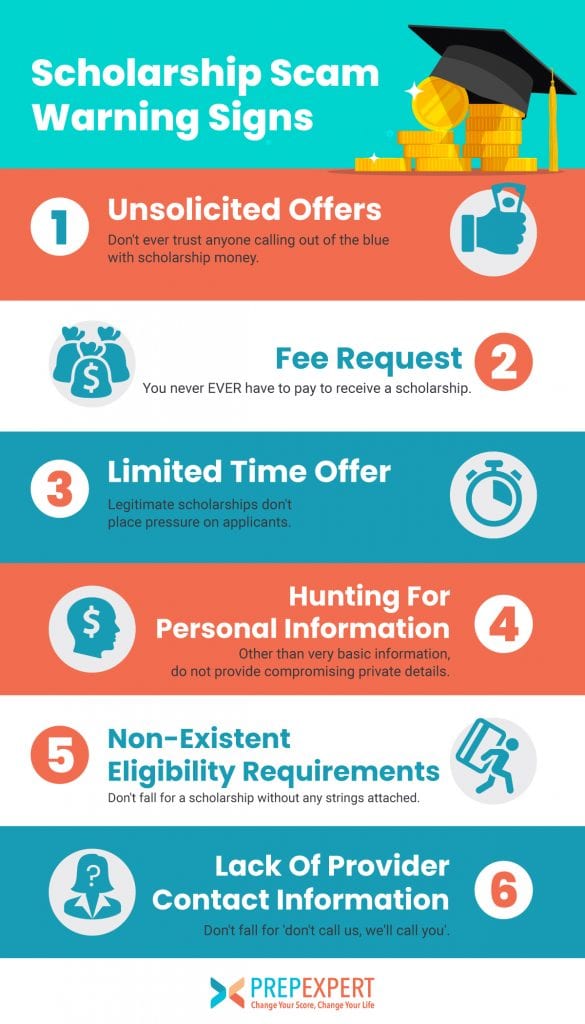Scholarship Scam Warning Signs | 6 Ways To Tell
The old saying “if it looks too good to be true, then it probably is” applies to college scholarships too, unfortunately. Criminals often target students and parents for personal and financial information through misleading scholarship offers.
If a scholarship offer looks or feels off, then there’s a chance it’s a scam. Be mindful of these common scholarship scam warning signs to avoid headaches.
If you’re looking for legitimate scholarship opportunities, here are some full-ride scholarships that you can try for now.
Unsolicited Offers
Don’t ever trust anyone calling out of the blue with scholarship money.
Here’s the first thing you need to know about scholarships – no one simply shows up and hands one off to you. Every legitimate scholarship is awarded once the recipient passes through the application and vetting process.
There are always criteria that you must meet and a formal application as well. If someone calls, emails, or mails you notice of a scholarship you’ve heard nothing about, then suspect it immediately.
Fee Request
You never EVER have to pay to receive a scholarship.
Scholarships aren’t sweepstakes; you don’t purchase something in order to have a chance of winning something else in return. Scholarship applications should only cost you time and energy, but never actual money.
If you receive any scholarship offer that requests you to send funds to secure the application, then it’s safe to automatically assume it’s a scam. The only money you’d ever have to consider spending is on postage for mailing paper applications. That’s literally the only exception.
Limited Time Offer
Legitimate scholarships don’t place pressure on applicants.
Don’t mistake deadlines for high-pressure sales tactics. Every real scholarship has a deadline. That fact isn’t in dispute. However, those deadlines are clearly stated upfront in the application guidelines.
The issue here is scholarship providers do not contact prospective students and pressure them into applying. There should never be a “now or never” presentation.
If so, then something is up with this so-called scholarship. You will know upfront when the scholarship application is due.
Hunting For Personal Information
Other than very basic information, do not provide compromising private details.
Every scholarship application will ask for certain information, such as your name, address, etc. However, if you’re being asked upfront about details such as your social security number, then be immediately wary.
Personal information like that is always targeted by scammers. If you win a scholarship, then it’s possible to provide that information then.
However, when first applying, do not ever feel pressured to give it out. If so, then immediately back out of the process.
Non-Existent Eligibility Requirements
Don’t fall for a scholarship without any strings attached.
If you are ever presented with a scholarship that promises to pay for everything with literally no strings or eligibility requirements attached, then walk away immediately. Every scholarship has criteria in place that applicants must meet for consideration.
Common ones include:
- Age
- Grade Level
- GPA
- Proposed College Major
If someone is promising you a huge financial reward for nothing, chances are 100% that it’s false.
Lack Of Provider Contact Information
Don’t fall for ‘don’t call us, we’ll call you’.
Legitimate scholarship providers will always have contact information, in case you have questions about the application, rewards, etc. Whether it’s by email, phone, etc., there will always be a clearly labeled means of contact.
Scam artists will often create fake websites that claim to be legitimate scholarships to lure in victims. A tell-tale sign is these websites will often avoid any contact details, or make the process extremely difficult.
If it looks like you can’t get ahold of anyone in the supposed organization, then don’t think twice about moving on. Legitimate scholarships have nothing to hide from the students they’re looking to help.
If you see any of these scholarship scam warning signs when looking for financial aid, immediately get away from the scammer. You don’t want that trouble.
For more test strategy, college admissions, and scholarship application tips sign up for our FREE class happening right now!
